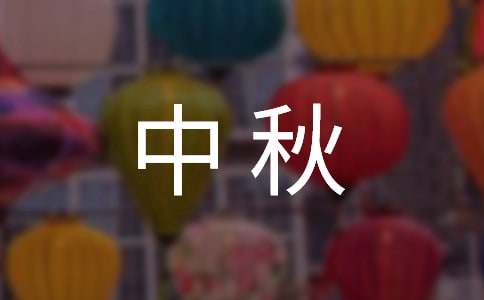中秋习俗英文介绍
中秋佳节,人们最主要的活动是赏月和吃月饼了。但中国地缘广大,人口众多,风俗各异,中秋节的过法也是多种多样,并带有浓厚的地方特色。下面是小编为大家收集的中秋习俗英文介绍,欢迎阅读,希望大家能够喜欢。

中秋节习俗英文介绍
In ancient times the "On the eve of Autumn Twilight" practices. On the eve of that worship Goddess. Set large incense table, put the moon cake, watermelons, apples, dates, plums, grapes other offerings, moon cake and watermelon is definitely not small. Also cut into the lotus-shaped watermelon. Under the month, the moon god on the moon that direction, Candle high burning the whole family followed by worship the moon, then the charge of the housewife cut happy moon cake. Pre-cut people who count the number of good family, at home, in the field should count together, can not cut more and no cut less the same size.
古代有“秋暮夕月”的习俗。夕月,即祭拜月神。设大香案,摆上月饼、西瓜、苹果、红枣、李子、葡萄等祭品,其中月饼和西瓜是绝对不能少的。西瓜还要切成莲花状。在月下,将月亮神像放在月亮的那个方向,红烛高燃,全家人依次拜祭月亮,然后由当家主妇切开团圆月饼。切的人预先算好全家共有多少人,在家的,在外地的,都要算在一起,不能切多也不能切少,大小要一样。
民间拜月
On rumored ancient folk worship ugly no salt, pious worship during childhood on, grow up to superior moral palace, but do not drive. A full moon on August 15, Son of Heaven to see her in the moonlight, feeling that her beauty is outstanding, after she was Queen, Mid-Autumn Festival on the resulting worship. Mid-Chang, to beauty, known for young girls worship it on, willing to "look like the goddess of the moon, face as bright moon."
相传古代齐国丑女无盐,幼年时曾虔诚拜月,长大后,以超群品德入宫,但未被宠幸。某年八月十五赏月,天子在月光下见到她,觉得她美丽出众,后立她为皇后,中秋拜月由此而来。月中嫦娥,以美貌著称,故少女拜月,愿“貌似嫦娥,面如皓月”。
文人赏月
The custom of scholars to celebrate the moon festival from months, serious joyous ritual became easy. Mooncake activities around the beginning of civil Wei and Jin Dynasties, but immature habits. The Tang Dynasty, the Mid-Autumn Festival, Wan Yue prevailed, read by many poets in the poem Ode to the Moon has. Until the time of Song, has formed a full moon in the activity center for the Mid-Autumn Festival Folk Festival, officially designated as Mid-Autumn Festival. And Chinese different from the Song moon is more a sense of things sad, often Teenage moon and new moon, Yu human events, even if moon night, the moon's clear light also could not conceal the Song of sadness
赏月的风俗来源于祭月,严肃的祭祀变成了轻松的欢娱。民间中秋赏月活动约始魏晋时期,但未成习。到了唐代,中秋赏月、玩月颇为盛行,许多诗人的名篇中都有咏月的诗句。待到宋时,形成了以赏月活动为中心的中秋民俗节日,正式定为中秋节。与唐人不同,宋人赏月更多的是感物伤怀,常以阴晴圆缺,喻人情事态,即使中秋之夜,明月的清光也掩饰不住宋人的伤感
But Song, the Mid-Autumn there is another form, that is, the joy of the Mid-Autumn Festival is secular: "Mid-Autumn Festival before, all shops are selling new wine, your family knot Taixie, homes on war accounted for restaurants Wan Yue, carousing heard a thousand miles away, play with sitting to dawn "(" Beautiful Dream to Tokyo "). Song of the Mid-Autumn Festival is a sleepless night, the night market open all night, Wan Yue visitors, Titan is not absolutely
但对宋人来说,中秋还有另外一种形态,即中秋是世俗欢愉的节日:“中秋节前,诸店皆卖新酒,贵家结饰台榭,民家争占酒楼玩月,笙歌远闻千里,嬉戏连坐至晓”(《东京梦华录》)。宋代的中秋夜是不眠之夜,夜市通宵营业,玩月游人,达旦不绝
Ming and Qing Dynasties, the result of the relationship between age, social life, highlighting the reality of utilitarianism, the festival, in the interests of a strong secular sentiment Yu, to "moon" as the center of the lyric and the myth of the literati tradition weakened, utilitarian worship, pray and secular feelings, aspirations of ordinary people form the main form of popular Mid-Autumn Festival. Therefore, the "civil Praying" become eager to join, recreation and well-being; to always focussed on.
明清之后,因时代的关系,社会生活中的现实功利因素突出,岁时节日中世俗的情趣俞益浓厚,以“赏月”为中心的抒情性与神话性的文人传统减弱,功利性的祭拜、祈求与世俗的情感、愿望构成普通民众中秋节俗的主要形态。因此,“民间拜月”成为人们渴望团聚、康乐和幸福;以月寄情。
中秋祭月
On the Mid-Autumn Festival in China is a very ancient custom. According to historical records, as early as the Chou dynasty, the ancient kings had the sun in the vernal equinox, summer solstice Jide, Autumnal Equinox Festival month, the winter solstice Heaven customs. Their place of worship called on the altar to altar, on the altar, the Temple of Heaven. Grouped in the four corners. Beijing, the Ming and Qing emperors on the altar is the place on Festival. "Book of Rites" reads: "Son of Heaven spring Asahi, Qiu Xi months. DPRK and the DPRK, on the eve of the eve." On the eve of the eve of here, that means it is night worship the moon. This custom has not only pursued by the court and the upper nobility, with the development of society has gradually affected the folk
在我国是一种十分古老的习俗。据史书记载,早在周朝,古代帝王就有春分祭日、夏至祭地、秋分祭月、冬至祭天的习俗。其祭祀的场所称为日坛、地坛、月坛、天坛。分设在东南西北四个方向。北京的月坛就是明清皇帝祭月的地方。《礼记》记载:“天子春朝日,秋夕月。朝日之朝,夕月之夕。”这里的夕月之夕,指的正是夜晚祭祀月亮。这种风俗不仅为宫廷及上层贵族所奉行,随着社会的'发展,也逐渐影响到民间
中秋的习俗
"Zhong Qiu Jie", which is also known as the Mid-Autumn Festival, is celebrated on the 15th day of the 8th month of the lunar calendar. It is a time for family members and loved ones to congregate and enjoy the full moon - an auspicious symbol of abundance, harmony and luck. Adults will usually indulge in fragrant mooncakes of many varieties with a good cup of piping hot Chinese tea, while the little ones run around with their brightly-lit lanterns.
农历八月十五日是中国的传统节日——中秋节。在这天,每个家庭都团聚在一起,一家人共同观赏象征丰裕、和谐和幸运的圆月。此时,大人们吃着美味的月饼,品着热腾腾的香茗,而孩子们则在一旁拉着兔子灯尽情玩耍。
"Zhong Qiu Jie" probably began as a harvest festival. The festival was later given a mythological flavour with legends of Chang-E, the beautiful lady in the moon.
中秋节最早可能是一个庆祝丰收的节日。后来,月宫里美丽的仙女嫦娥的神话故事赋予了它神话色彩。
According to Chinese mythology, the earth once had 10 suns circling over it. One day, all 10 suns appeared together, scorching the earth with their heat. The earth was saved when a strong archer, Hou Yi, succeeded in shooting down 9 of the suns. Yi stole the elixir of life to save the people from his tyrannical rule, but his wife, Chang-E drank it. Thus started the legend of the lady in the moon to whom young Chinese girls would pray at the Mid-Autumn Festival.
传说古时候,天空曾有10个太阳。一天,这10个太阳同时出现,酷热难挡。弓箭手后翌射下了其中9个太阳,拯救了地球上的生灵。他偷了长生不死药,却被妻子嫦娥偷偷喝下。此后,每年中秋月圆之时,少女们都要向月宫仙女嫦娥祈福的传说便流传开来。
In the 14th century, the eating of mooncakes at "Zhong Qiu Jie" was given a new significance. The story goes that when Zhu Yuan Zhang was plotting to overthrow the Yuan Dynasty started by the Mongolians, the rebels hid their messages in the Mid-Autumn mooncakes. Zhong Qiu Jie is hence also a commemoration of the overthrow of the Mongolians by the Han people.
在14世纪,中秋节吃月饼又被赋予了一层特殊的含义。传说在朱元璋带兵起义推翻元朝时,将士们曾把联络信藏在月饼里。因此,中秋节后来也成为汉人推翻蒙古人统治的纪念日。
During the Yuan Dynasty (A.D.1206-1368) China was ruled by the Mongolian people. Leaders from the preceding Sung Dynasty (A.D.960-1279) were unhappy at submitting to foreign rule, and set how to coordinate the rebellion without it being discovered. The leaders of the rebellion, knowing that the Moon Festival was drawing near, ordered the making of special cakes. Packed into each mooncake was a message with the outline of the attack. On the night of the Moon Festival, the rebels successfully attacked and overthrew the government. What followed was the establishment of the Ming Dynasty (A.D. 1368-1644). Today, moon cakes are eaten to commemorate this event.
在元朝,蒙古人统治中国。前朝统治者们不甘心政权落入外族之手,于是密谋策划联合起义。正值中秋将近,起义首领就命令部下制作一种特别的月饼,把起义计划藏在每个月饼里。到中秋那天,起义军获取胜利,推翻了元朝,建立明朝。今天,人们吃月饼纪念此事。
【中秋习俗英文介绍】相关文章:
介绍中秋节习俗英文作文01-28
中秋节的习俗中英文介绍09-26
元旦的习俗英文介绍09-27
春节习俗英文介绍02-10
宋代中秋习俗介绍10-02
中秋节习俗介绍10-21
中秋节的习俗介绍10-31
各国中秋习俗介绍10-03
中秋节习俗的介绍04-02